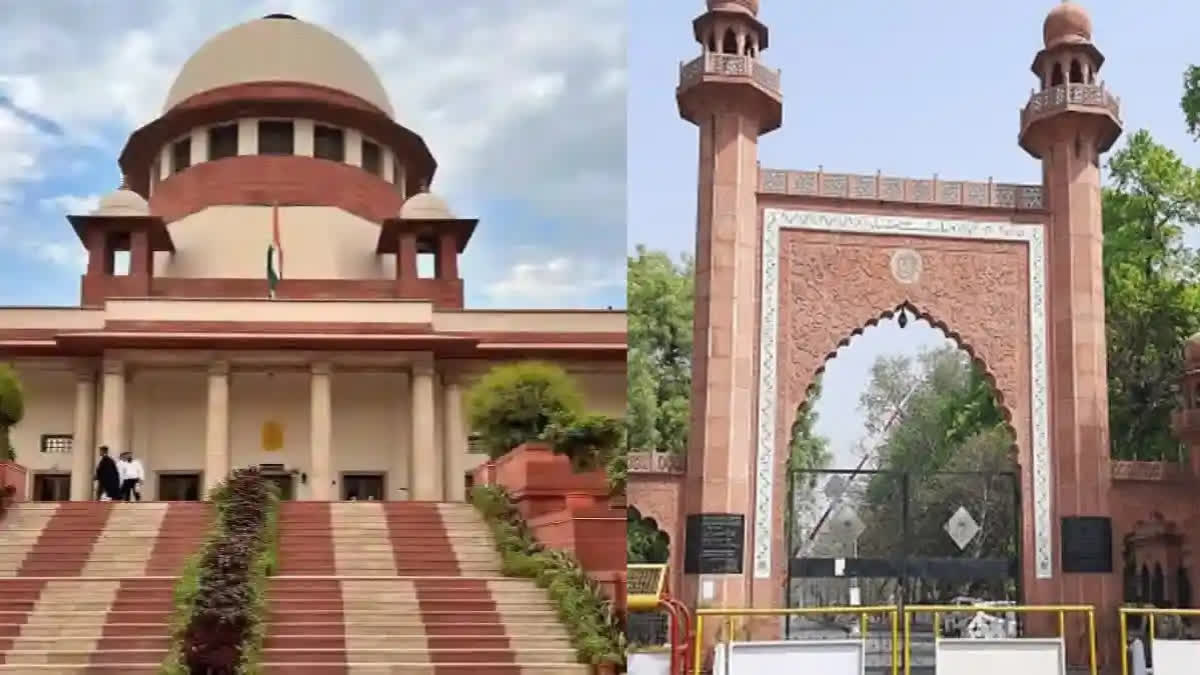New Delhi: The Supreme Court Wednesday told a counsel appearing for original petitioners and arguing against granting minority status to Aligarh Muslim University (AMU) that in the eagerness to uphold the striking down of the 1981 AMU (Amendment) Act, “let us not do something which substantially cripples the power of Parliament”.
On the line of argument chosen by the counsel, the apex court stressed that it “should not be doing something which substantially mutes the powers of the Parliament for future…” In 1967, a five-judge constitution bench in the S Azeez Basha versus Union of India case in 1967 held that since the Aligarh Muslim University was a central university, it cannot be considered a minority institution. The university got back its minority status when Parliament passed the AMU (Amendment) Act in 1981.
A seven-judge bench led by the Chief Justice of India and comprising Justices Sanjiv Khanna, Surya Kant, J B Pardiwala, Dipankar Datta, Manoj Misra and Satish Chandra Sharma, is hearing a batch of petitions regarding the minority status of AMU. Senior advocate N K Kaul, representing some original petitioners, said that by deletion of the word established and amending the definition of university, “you cannot remove the basis of Basha which recognizes the historical fact..... Basha recognizes the historical facts regarding AMU.”
Kaul insisted that change in legislative history is not possible in the manner in which the 1981 Act is seeking to do and that cannot happen, “one cannot change legislative history and a historical fact cannot be revised or altered either by a legal fiction or by a parliamentary fiat”. Kaul stressed that a historical fact remains a historical fact. He said a legal provision can be changed but how could one remove a historical fact, and also by a subsequent legislation cannot deny the fact.
Kaul said the fact is that an Act came into being and Muhammadan Anglo-Oriental (MAO) College was dissolved by 1920 Act, and the fact is a new university came into existence after negotiations. The Centre had told the Supreme Court that AMU surrendered its minority character when it was conferred with the university status under the 1920 AMU Act.
Kaul contended that parliamentarian Somnath Chatterji had categorically said an institution was established in a manner, such a manner of establishment cannot be changed through retrospective legislation, as legislation cannot change history.
At this juncture, CJI said when Parliament deleted the word established by 1981 amendment, then the entire incorporation of the university would have to come to an end, but possibly it was open to Parliament to take a particular view that what the 1920 Act did was to give it a form of a statutory university but that does not dilute the fact that it was established by Muslim.
“That 1981 Act does not take away the basis of Basha, you may be on firmer ground because the 1981 Act makes no changes to administrative provisions of the 1920 Act, it leaves them intact…”, observed the CJI.
Justice Khanna said Mr Kaul , your best argument is that once a university is established pursuant to particular enactment, you cannot just say it was not established. “Then, you would be going back to what, there would be a void”, said CJI. Kaul said that is exactly what he is saying.
The CJI said: “there is little problem conceptually because it is always open to the legislature. Legislature is not bound to take notice of facts as they emerge….power of legislature that is what they do all the time with Income Tax law…..”
Justice Khanna said: “it is also well settled that the legislature can make laws with retrospective effect. Suppose they were of view that by mistaken notion they used the word established, they could have always removed it….”
The CJI said “Mr Kaul, you are also appearing on the side of the government and in the eagerness to uphold the striking down of the 1981 amendment let us not do something which substantially cripples the power of Parliament. We should be very averse to that kind of interpretation for the future”.
“In the effort to sustain the decision of the Allahabad High Court and get over the 1981 amendment, we should not be doing something which substantially mute the powers of the Parliament for future, we have to be very careful. Because what we are doing is laying down law for the future…”, the CJI orally observed.
Kaul said there are actions of Parliament which were struck down and actions of Parliament held to be ultra vires. “Parliament is entitled to say that we take a particular view of the established, as opposed to a factual view and as opposed to a legal view…..”, said the CJI.
The CJI said Parliament can make that distinction between incorporation and setting up and to say that what meant by the word established is actual setting up and not legal form given to it by incorporation of a university, possible! “Let us not go into a wider context and dilute the powers of the Parliament by laying such a broad proposition that it is not open to Parliament while legislating to take a view of historical facts to the contrary, even if it is embodied in a judgment of the court. Let us not!”, said the CJI.
The bench told Kaul that is why we said on the second point you are on a surer footing that they never changed the administrative basis of 1920 Act in 1981 Act. The hearing in the matter will continue in the post-lunch session.
- " class="align-text-top noRightClick twitterSection" data="">
Read More


